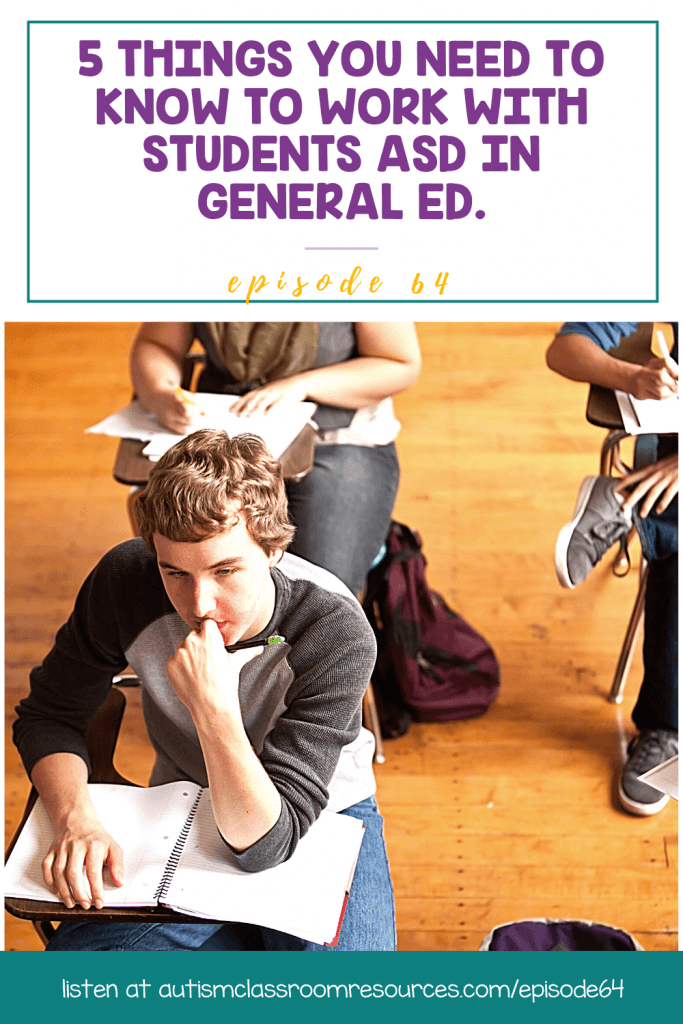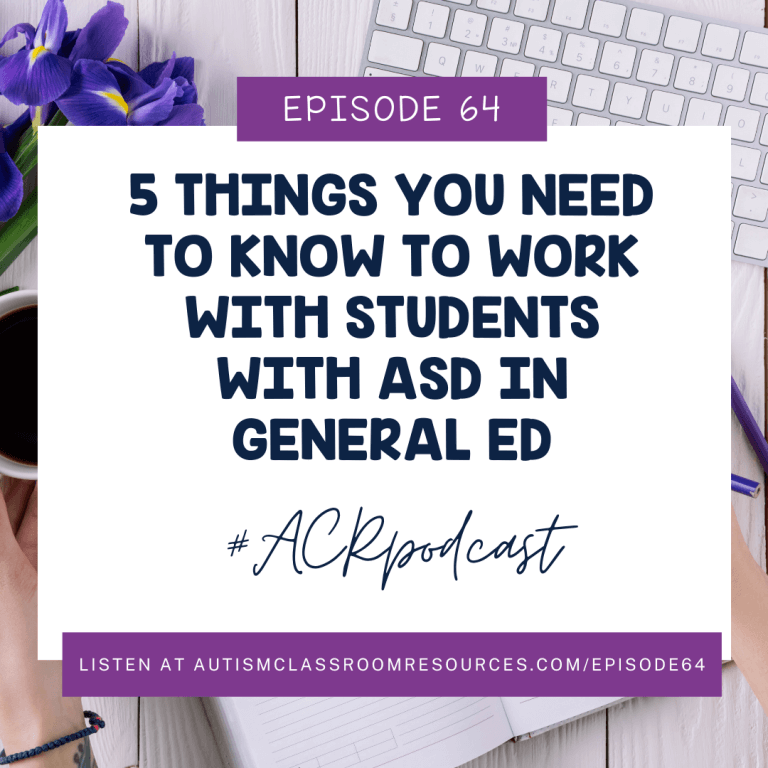Welcome to the launch of 2021 in the Autism Classroom Resources podcast. I’m going to structure the podcast just a little different over the coming year, I think. I’ll be doing a series of podcasts each quarter in spurts of 2-4 episodes at a time. So there will be 2-4 episodes and then a week off and then another spurt.
In between there will be a few more blog posts. There are just some things I can only really SHOW you in blog posts that I can’t do with a podcast. I’d love to hear your thoughts on format. So definitely drop me a line on social media or in our free Facebook group at specialeducatorsconnection.com
Today, I’m starting out with a 9-episode theme of individuals with high functioning autism spectrum disorder. These are students with ASD who are working on grade level standards in general education. And that is where we are going to start today.
The Spectrum of Autism
Let me start by saying this. Historically, these students have been referred to as having high functioning autism. In general, I tend to move away from that term because I don’t think it really defines anyone that well. I’m honestly not sure what type of term really defines them other than being on the autism spectrum. And being an individual.
As many if not most of you know, autism is a spectrum of characteristics. And it also spans a spectrum of cognitive abilities. There is also much research looking at the validity of being able to determine the cognitive abilities of individuals on the spectrum due to sensory differences, communication issues, and other characteristics of the spectrum.
Within the course of a podcast. I can’t cover all the relevant characteristics of autism across the whole spectrum. Instead in today’s episode, I want to focus on 5 issues that I see that affect most individuals who fall in the high functioning autism category.
Who Are Individuals with High Functioning Autism?
To define what I mean by this, I’m referring primarily to students who are usually on grade level or above. They are most often in general education classrooms. And typically their cognitive abilities are assessed to be average to gifted range.
Over the years I’ve worked with many of these students. And I can tell you one thing for sure as an educator. Being “high functioning” does not mean that these students have an easier time of it in school. Or that they have fewer needs. It also doesn’t mean that they are less complex or easier to work with. In fact some of the most challenging situations I’ve dealt with over the years have been students in general education.
5 Things You Need to Know to Support Individuals with High Functioning Autism
These aren’t all the characteristics that individuals with ASD present. But, these 5 characteristics and concerns are part of the reason why these students can really struggle in school. I see them as the 5 issues that we run up against with their interactions around the school. And many of them are related to others’ expectations of the students or perceptions of the students’ behavior. Many times they are the reason they get in trouble. And they are issues that we must address in order to provide quality education and support their needs within school.
#1 Autism is Often an Invisible Disability
Autism for students on grade level is often an invisible disability. These are typically students who don’t have a physical disability. However, they also don’t have an evident speech or communication deficit. Their social deficits are sometimes less glaring but no less problematic, which I’ll get to in a bit.
People don’t always recognize that this is a student who may need additional support. This is particularly true for students whose cognitive abilities or cognitive testing indicate that they have the capacity to understand the work. However, there is a big difference between the capacity for the work and the execution of the work, particularly as the student advances in grades.
Expectations
In short, the biggest problem that the invisible deficit has for these students is that people expect more of them than they are often able to deliver. They don’t think they need support. And sometimes the students don’t want the support. They don’t want to look different. And they get that message from the adults around them at times too. So we see them struggle academically and also behaviorally. And we see mental health issues, because the expectations are more than they can manage.
#2 Cognitive Abilities and Social Emotional Functioning are Not Aligned
Along those same lines, one of the biggest divides I see for these students are that their cognitive abilities and their social-emotional functioning are not aligned. But people expect them to be. They expect if a student has an IQ of 140 that he can “think his way through” to understand social situations and emotional functioning. But it doesn’t work that way.
I worked with a brilliant, amazing, gifted student in high school and his team for quite a while. He had an IQ of about 150. And he drove his high school teachers crazy because he would sit and read books in class. His response? I already know the material. And he did. But he didn’t understand the message it was sending to the teacher about his respect for the class. That was a minor example of the kind of things that got him in trouble. But sometimes those little things add up.
Smart is Not Enough
One of things that was put in place was for me to come in and work with his teachers before school began to help them understand the nature of his disability. I spent a lot of time talking about how cognitive intelligence and emotional intelligence were not the same. And of course I gave lots of examples. I hammered on it pretty heavily. So much so that by the end of the training the teachers said, “OK we get it….he doesn’t get social situations even though he’s brilliant.” And they thought they got it. And I thought maybe they did.
Then, halfway through the semester I got a call asking me to come back and retrain the staff. My first response….they found out how really smart he is didn’t they? Yep, said the coordinator. Once they realized how brilliant this kid was…they couldn’t understand how he just didn’t know better. But he really, really didn’t.
I’ll be hitting more on this point in future episodes in this series, because it really deserves its own podcast. But for now, suffice it to say….being smart is not enough. Social intelligence and cognitive intelligence are not always connected for some of our students.
#3 Individuals with High Functioning Autism Still Need Explicit Instruction
Just because students with high functioning autism are on grade level doesn’t mean that all the academic content comes easily to them. Often, they still often struggle with some elements of the curriculum (like reading and math).
But many of them still need explicit instruction in elements that impact their learning that aren’t subject-based. Take executive functioning skills, for example. Students with ASD typically struggle significantly with EF skills…and I have a whole episode planned on these as well. EF skills account for our ability to organize our time, our materials and more. They allow us to get done what we need to get done and to solve problems.
Executive Functioning Skills
Without good EF skills, our students don’t turn in their homework (even though they may or may not complete it). They don’t know what homework to do. And they don’t follow lecture material; they don’t know what material is relevant from the lecture and so on.
They may not have specific learning disabilities in reading and math. But, they still have learning areas that they need to be working toward independence on. These are often students who have the capability to go to college. But we have to make sure we are preparing them to be ready for that environment. Because otherwise their high school diploma is not helping them move forward. However, if they do their assignments but leave them in their backpack or on their computer…they will fail their courses. We have to teach them how to function in the more complex environments explicitly. No amount of expectation will solve these issues.
#4 Individuals with High Functioning Autism’s Communication Deficits Have Broad Impact
By definition, individuals with ASD, regardless of their cognitive abilities, have difficulties with communication. While the communication issues for these students may be more related to social skills, they also have other impacts. One of the most significant impact is on reading, literature, and other subjects involving more abstract thinking. And that can even work its way into math.
Understanding what they are reading can be an area of deficit for them. And it becomes an even bigger problem as they get into thematic literature in English courses in high school. Narrative use of language, understanding the perspective of characters, and even the social deficits of ASD can play a role here as well.
So this is an area where we really have to support the students to support their academics. They don’t have a typical reading disability that many specialists are used to supporting. But they still need support to progress with their reading skills in the academics.
#5 Social Skills Intervention is a Significant Area of Need
Finally, social skills are a significant area of concern for these students. These are students who can go on to college, potentially, and hold a job. But typically what loses those opportunities for them are not that they can’t do the work or master the curriculum, it’s the social situations.
One of the trends we are seeing in schools now is a move toward more cooperative learning. That’s because it’s how more jobs are structured. This is an area where you will see more difficulties for these students. And it’s where you can document the impact of their social disability on their academic performance.
I saw this appear as early as elementary school with one school system that started a math curriculum that relied primary on group practice and learning. Suddenly the students I worked with who had ASD that usually managed math fine were struggling….because of the social problems of managing the group work.
How much does it mean if you pass all your courses but you can’t use any of what you learned because you aren’t given the opportunity based on your behavior and social skills? If we skip over those issues because they aren’t “school related” then we have a problem.
Summary
Those are our 5 things that I think everyone should think about when working with students who are on grade level with ASD…and many of them apply to some other disabilities as well. The key to each of these 5 issues is raising awareness of staff about student’s disabilities and effective planning for intervention. Coming up in this series, I’ll be talking more about some of these including strategies we can use to address some of these concerns.
In the meantime I’d love to hear your questions and thoughts about how to support these students. If you are an educator, hop over to our free FB group at specialeducatorsconnection.com and share. And if you work with someone who you think would benefit from this series, definitely share this podcast with them. And don’t forget to leave a review on your favorite podcast player!
I’ll be back next week with another episode…until then…thanks for all you do for your students.






